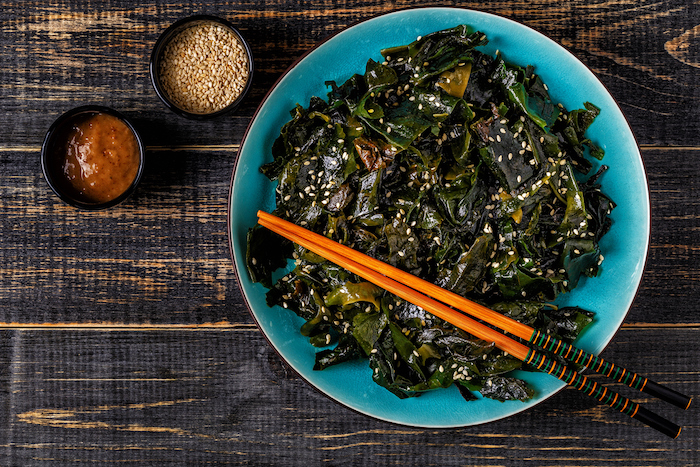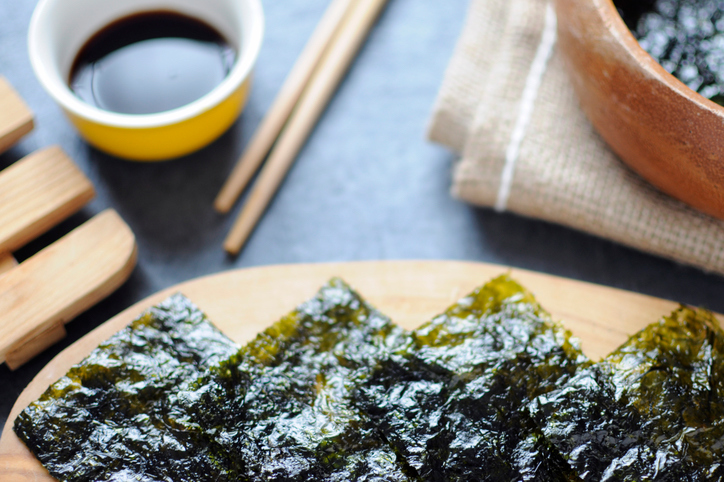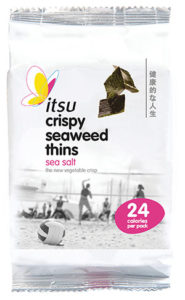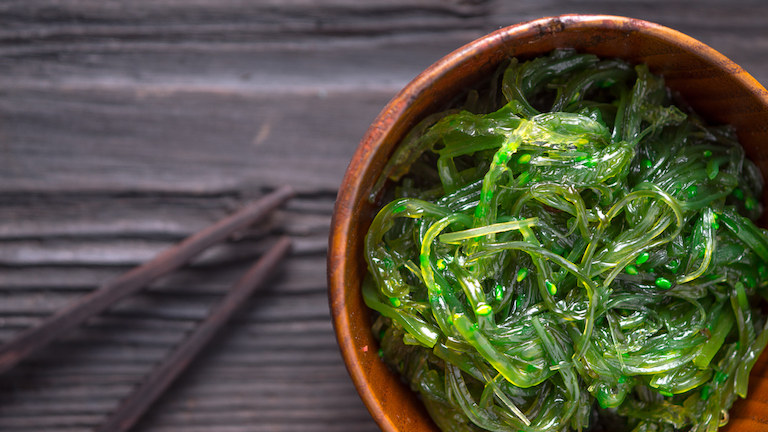From celebrities to chefs, seaweed is the food on healthy foodies’ lips right now. Anna Magee finds out why – and what the hell to do with it
When Jamie Oliver shed two stone a couple of years ago, along with cutting out white, unprocessed foods, he also added seaweed to his diet, calling it ‘the most nutrtious vegetable in the world’.
Since then, seaweed as a food has steadily risen in popularity and its global worth is estimated to reach a staggering $17.59 millionUSD by 2021.
Now, as eco-campaigners claim eating more algae could help save the world’s fish stocks, adventurous chefs are flavouring ice-cream with it, Instagrammers are replacing their courgette spirals (so 2017) with seaweed spaghetti and seaweed company Seamore has even made bacon – yes, bacon – made from seaweed (and believe it or not, aside from a slightly fishier aftertaste, the algae alternative tastes a little like the pork-based original). Mind you, Heston Blumenthal was calling for seaweed to be added to NHS meals as early as 2011.
Supermodel Chrissy Teigen opts for seaweed as a snack
Algae’s growing popularity is thanks not only to its ability to add distinctive flavour to any meal, but also to its unbelievably impressive nutrient CV, which has been tested for longevity for thousands of years by the Japanese population. ‘Japanese life expectancy is one of the longest in the world and their dietary habits are often heralded as part of the reason for this long lifespan,’ says nutritionist Charlotte Stirling-Reed.

‘The Japanese diet features plenty of nutrient dense foods, partoculalry seaweed and miso,’ Stirling-Reed continues. A study in 2016 showed that Japanese individuals who adhered closest to Japanese dietary guidelines had the lowest mortality rates.’
For celebrities, it seems to be a salad essential or snack of choice.
Despite its unfortunate name, Victoria Beckham swears by bladderwrack as one of her slimming secrets. Supermodel Chrissy Teigen opts for seaweed as a snack and says ‘Seaweed sheets are my go-to for my salty chip cravings, especially wasabi flavored ones’. Oprah, Gwyneth, even Heston Blumenthal – all fans of eating seaweed.
Now, let’s take a closer look at that nutrient resume along with what the hell to do with this stuff.
It’s high in protein and other nutrients
Containing 10-20 times the nutrients of most land vegetables, seaweed is bursting with vitamins, minerals and all the essential amino acids our bodies need to stay healthy.
Seaweed is also one of the few non-animal sources of vitamin B12, which is needed for healthy blood and nerve tissue. Arame (try Clearspring £4.65, 50g from Healthista Shop) and Wakame (Atlantic Kitchen, £5.95, 40g from Healthista Shop) are also great sources of calcium, folate and magnesium, while purple laver is especially rich in B vitamins.
It’s especially rich in iodine – which you probably need
Research by the British Thyroid Association, found that 70% of young women in the UK are iodine deficient, a condition that can cause thyroid dysfunction, leading to weight gain, dry skin, hair loss, tiredness and depression as well as intolerance to cold. But research on 2000 women released last week by Healthista found that over 50 per cent don’t know what iodine is.
Now, thanks to the rise of veganism and the growth of sales of soya, almond and other milk substitutes year on year, experts have warned that iodine levels could fall further after a study in October last year found that the majority of milk alternatives do not have adequate levels of iodine, with concentrations at around two per cent of that found in cow’s milk (although some are fortified).

Experts also warn that deficiency can affect fertility, pregnancy and brain and physical development in young children. ‘Iodine is important in the diet as it contributes to normal thyroid function, normal brain function and also normal growth in children,’ says Charlotte Stirling-Reed.
Try replacing your crisp or nut habit with seaweed crisps. We like itsu’s Seaweed Thins (from supermarkets). At only 22 calories a pack, they cost you a fraction of what a bag of crisps would in calories. Plus, they provide 65 per cent of your daily iodine needs
It can help you lose weight
In 2014, research from Newcastle University suggested that seaweed could be a key ingredient to losing weight as a compound found in it stops the body from absorbing fat. It found that alginate, which is found in sea kelp, can help to suppress the digestion of fat in the gut. The researchers said that if the alginates can block the fat digesting enzyme, the body will absorb less fat and stop people from becoming obese.
Seaweeds like kombu (try Clearspring Organic Kombu Seaweed £5.49 from Healthista Shop) are a valuable source of iodine, which is needed for healthy thyroid function and to regulate our metabolism. There is also a pigment in kombu called fucoxanthin, which is a carotenoid that may boost production of a protein involved in fat metabolism, assiting weight loss.
It’s great for bone-building
Red marine algae (try Seakura’s Moroccan salad with red Gracilaria seaweed salad from Planet Organic shops, 200g, £2.67) is full of bone-boosting minerals, though, as a rule, the darker green seaweeds contain the highest calcium content, with some types containing more calcium than cheese. But equally important is seaweed’s bone boosting magnesium quotient. The ideal ratio for bone building is two parts magnesium to one part calcium. That’s what’s needed to carry the calcium into the bones and ligaments.
It’s heart healthy
Marine algaes contain peptides that are great at lowering blood pressure, so great in fact that they are already being added to functional foods like breads and soups in a bid to lower rates of heart disease in the States. A high intake of seaweed might also explain why one of the longest-living nations on earth, the Okinawans, have low cholesterol and low homocysteine (a heart-damaging chemical) levels, since a twenty-five year long study showed that sea vegetables were among the seven to 10 portions of fruit and vegetables they eat daily.
It balances blood sugar
Adding seaweed to meals can reduce blood sugar spikes and help us feel fuller for longer. Scientists at the University of Newcastle upon Tyne have also researched alginate, in brown seaweed (arame), and found that it can strengthen gut mucus, which protects the gut wall, while also slowing down the digestion of carbohydrates. Similarly, researchers have found adding extracts from brown seaweed to a meal may reduce blood sugar spikes and offer potential benefits to people at risk of type-2 diabetes. While a Sheffield University study found that alginate can reduce cholesterol and glucose uptake in obese subjects to the levels of healthy subjects.
It’s a detox dynamo
Seaweeds purify and balance the ocean, and, say health experts and they can do the same for us. Certain seaweeds, such as arame and hijiki have plenty of soluble fiber, which promotes detoxification, mopping up heavy metal toxins like those found in pollutants like cigarette smoke and exhaust.
It’s great for skin
Just one sheet of nori (try our favourite is Clearspring’s Organic Sushi Nori Sea Vegetable £2.99 ) contains more skin-boosting Omega 3 oils than two whole avocados at a fraction of the calories. And it’s not the only one, red seaweed is also a great source of omega 3s. High levels of Omega 3 have been shown to reduce inflammatory compounds, which may reduce the risk of acne and other skin problems, as well as leading to smoother, younger-looking skin. Winter is a great time to up our omega 3s helping to counter the dehydrating effects of central heating. In 2013, Scottish researchers found that algae can help fight acne too.
7 easy ways to get more seaweed into your diet
Instead of your morning coffee No seriously, miso soup, a broth made from the paste of femented soya beans is high in protein. But the instant Miso Soup sachets made by itsu, from supermarkets, contains small seaweed pieces which boost its levels of nutrioents including zinc and vitamin B12
In salads Chop sea-lettuce or soaked wakame and sprinkle it into salads, paired with rice vinegar, toasted-sesame oil and cucumber. Try Seaweed Salad Condiment from Seagreens £9.75 from Healthista Shop. Try sprinkling, scrunched, dried seaweed over salads or soups (it’s SO delicious – a Healthista favourite).

Make sushi For DIY healthy sushi, cover a sheet of dried nori with cooked brown rice; add a layer of sliced carrots, celery, or avocado, and add a dash of wasabi. Roll it up and dip in a sauce of tamari, toasted sesame oil, ginger, and rice vinegar.
Make broths with it To make a wonderful broth called dashi (Japanese stock), simmer dried kombu in water until soft. Cook sheets of wake into miso soup if you’re making it at home. Try Atlantic Kitchen’s Wakame Seaweed £5.95 from Healthista Shop.
Add it to bean dishes Throw a kombu leaf (we like Clearspring’s Organic Kombu £5.49) in the pan when you cook with pulses or beans. The plant’s glutamic acid helps make the beans more easily digestible and less gassy.
Have it instead of pasta (no really, seaweed is the new courgetti) Mind you, you have to like a fishy flavour as the new rage for pasta made entirely of seaweed is here to stay. We have seen three brands doing this already. Basically, seaweed strips are dried and you boil them in the same way you would pasta. There’s very little of the slime you would expect and a delicate, sea-like flavour. Our favourite is Atlantic Kitchen’s Sea spaghetti Organic Seaweed £5.99
Use it in stir-fries. Spruce up vegetable stir-fry with chopped arame or sea-lettuce or add shredded seaweed ribbons to add favour to any grain dish.
Use it instead of salt Healthista HQ has seen a number of artisan companies bringing out iodine rich seaweed flakes to replace salt that come without any of the health risks of too much table salt. We knocked it at first too but they taste great and really do give that salty flavour savoury lovers adore. Our absolute favourite is the Conrwall-based Mara seaweed that makes a selection of different seaweed seasonings (the Applewood Smioked Dulse £5.99 is unbelievable) from different types of algae. For a salty tasting salt replacement Salternative Kombu Seaweed £3.99 from Healthista Shop.
READ MORE:
The new rules of healthy snacking
Read this amazing 12 week weight loss transformation by Healthista writer Vanessa Chalmers
WE LOVE: Itsu’s healthy snacks that are crazy low in calories
Like this article? Sign up to our newsletter to get more articles like this delivered straight to your inbox.





















































